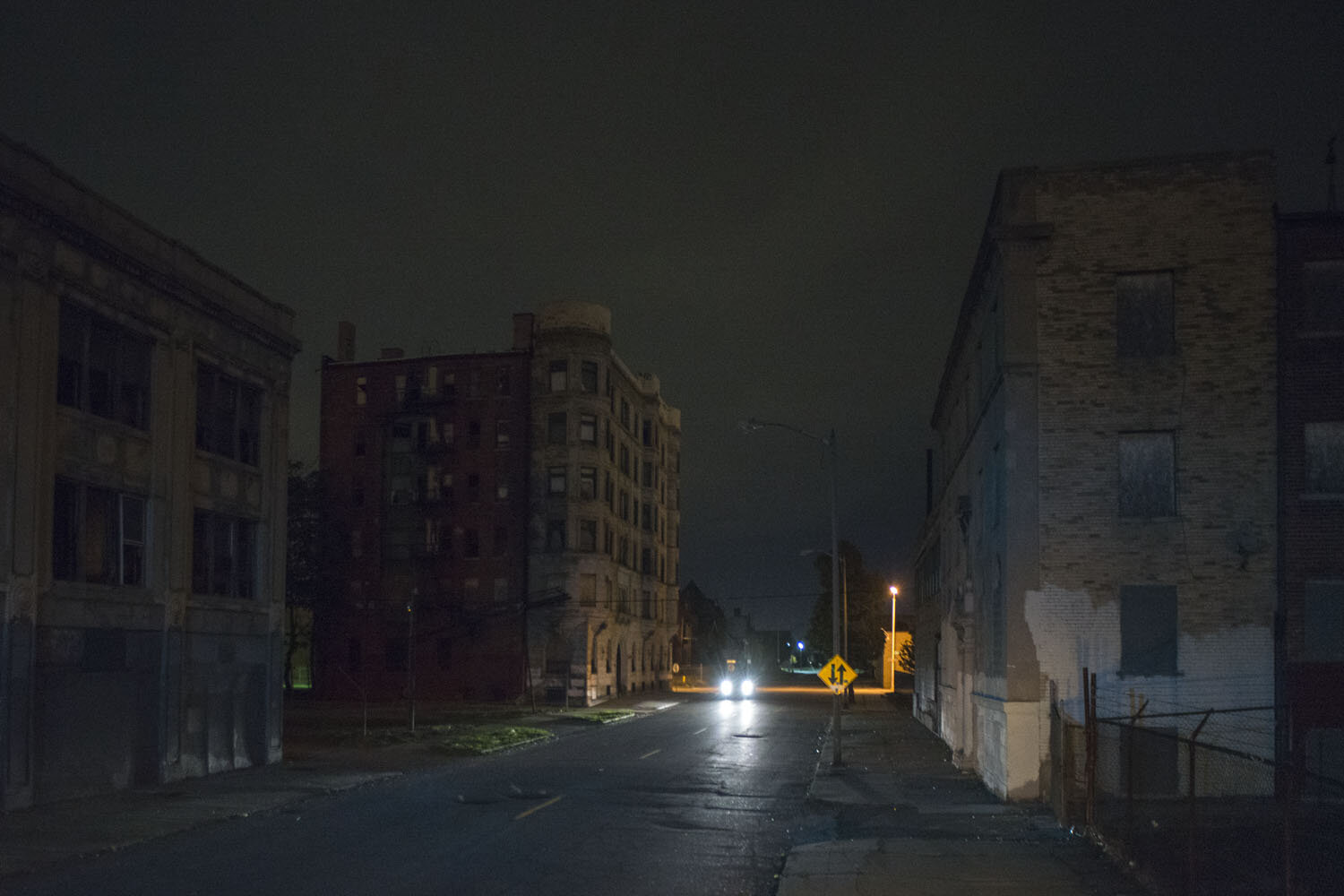Distance
Jason Schwartzman
Detrot by Night. Camilo José Vergara. Time Magazine.
From far off, I see a solitary figure coming toward me – the distance gives us time to contemplate each other. It is the Detroitness too, this feeling that there are not many other people around. The tall beige buildings have shed their glass, the windows just rectangles of black. I am trying to return to the hostel, my camera around my neck, my laptop in my backpack containing everything I’ve ever written. On a red brick wall nearby there are two black arrows pointing in different directions. One arrow is captioned: “This Way To Lose.” The other arrow says: “This Way To Die.” I am constantly comparing this city to St. Louis, giving it the short end of the stick. But it isn’t quite fair: I spent so much time there and am just a visitor here – a tourist with one quick view. The guy comes into focus and I can tell he is homeless or very poor by the dirt streaks on his clothes. As he drifts closer, I can see him eyeing my camera.
He gestures rapidly with frenetic hand motions while my heart thumps. He is going to rob me and there’s nothing I can do. There is no one even within earshot – it has been minutes and avenues since I saw another human being. And then I understand. He’s deaf and he’s signing, asking me to take his picture. He sees I’m not from here, that I’m trying to photograph Detroit. When I think of Detroit, I think of weedy lawns and the rubble within the Packard Plant. I think of the spectral train station.
Maybe he’s thinking, “Hey – I’m Detroit, too.”
The man gives me his biggest smile and I take his picture. He starts signing again: “I’m hungry,” I think he’s saying, but it’s hard to know. Maybe he hopes I can help him get something to eat. I angle myself away, I think I have some singles, but “Fuck it,” I think, “I’ll just give him a 20.” The Detroitness. If the circumstances were slightly different, it could easily be my own ransom note, but I hand the money over without a word. He takes it, sees it – he is so surprised he cries out.
His hands are moving faster now, complicated patterns in the space between us. I can’t understand any nuance beyond the obvious joy; the only word I know in sign language is the gesture for divorce, two fingers together and parallel, and then moving apart, slowly, until the speaker’s arms have reached their limits, the two people already transported to opposite ends of the earth.
He can’t stop smiling.
We fist bump and I walk away, but after a few steps I look over my shoulder – I can feel the suspicion still in me like a toxin. I want to make sure he isn’t following me, that he hasn’t decided he wants more where the money came from. I am naturally a little guarded, but I wonder if the suspicion is me or if it is me in this city.
I look back and he’s in the same spot – he hasn’t moved an inch. He’s still smiling, signing, saying something I wish I could hear.
Jason Schwartzman is the author of NO ONE YOU KNOW, forthcoming from Outpost19 on May 4, 2021. His writing has appeared in the New York Times, New York Magazine, Narratively, The Rumpus, Hobart, River Teeth, Human Parts, and elsewhere. You can find him on Twitter @jdschwartzman and more of his writing on jdschwartzman.com. He’s a founding editor of True.Ink.



